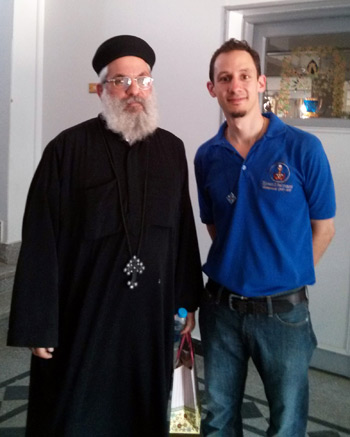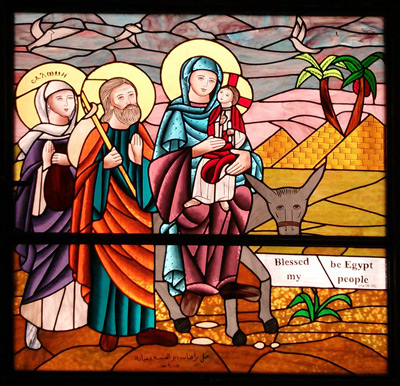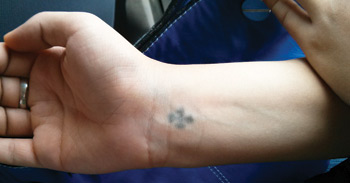Egypt’s Big Role in God’s Story
By Father Joe Goldsmith and Angie Atef
Angie, a delightful Coptic Christian and myself, a young Catholic priest, were brought together by a two-week VMMissions learning tour in Egypt called “Walking the Nile.”
While questions of the president, the economy, and the upcoming demonstrations loomed in the foreground, Angie and I often shared the backseat of our microbus and turned our conversation to Christian history.
The Coptic Orthodox Church and the Catholic Church divided in the year 451 AD over an argument about the nature of Christ. In spite of this split, which itself has been theologically reconciled, we share the same treasury of our Christian roots and the more I think about it, I realize that Christianity itself is stamped with the mark of Egypt.

“Twins” Abouna Yusef (Father Joseph), a Coptic priest, with Father Joe Goldsmith.
From Egypt, we have theologians like Athanasius who presided over the early councils and whose hand gave us the Nicene Creed. From Egypt, we have the desert mothers and fathers like Anthony who lived their faith in radical devotion to God. From Egypt we have the most significant school of Scripture study in the early Church and its founding is credited to St. Mark.
When I asked Angie what she thought about St. Mark, she responded, “To me personally, I owe him my life. Without him I would never know anything about Jesus Christ.” The selfsame Gospel writer Mark went to Egypt to bring the Good News. He was martyred in Alexandria and the legacy of his leadership continues to this day. The chair of the Coptic Pope is called the Throne of St. Mark.
Although the Bible only tells us that Joseph was instructed in a dream to pack up and go, the Egyptian stories and customs abound of where the holy family visited and stayed. This includes six months in Angie’s hometown, called Il-Qosseya. As a child she used to ask her parents, “Did they stay at our grandparents house?”

“Holy family window”—This is a typical stained-glass representation of the holy family traveling through Egypt. One tradition holds that Salome accompanied them. It comes from the Church of St. Mina in Beni Suef.
Our group spent time reflecting on the holy irony that Jesus himself went back to Egypt. His own people could never forget Egypt not only because of the Exodus but also because God commanded the celebration of the event with a sacred meal, the Passover.
Indeed their memory was stamped with the adventures of Moses and the incredible story of Joseph and the great father figure, Israel. Trace all the way back to the book of Genesis and we see that Abraham and Sarah too spent time in Egypt—in search of food.
To know the story of Egypt is to know the whole Christian story at once—a story of personal calling, of provision, and of the promise of salvation.
Although Christians number only ten percent of the population in Egypt, Angie has a deep sense of pride. Her roots touch St. Mark, they touch Jesus and his faithful parents, and they touch the great figures of the Old Testament.

An old Coptic custom is to have a cross tattooed on one’s forearm. Angie received hers when she was a little girl, which is typical.
Knowing all of these things, Angie said to me with a twinkle of hope in her eyes, “Egypt still has some role in God’s work of salvation.”
Father Joe is a priest at Blessed Sacrament Catholic Church, Harrisonburg, Va.
Angie Atef is an Egyptian Coptic Christian from Cairo. Photos courtesy of Joe Goldsmith.
